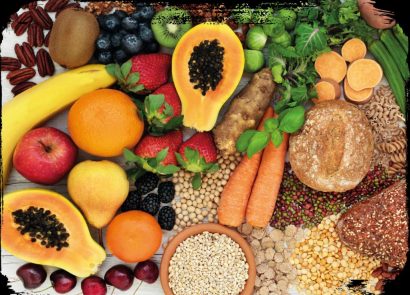Convinced carbs are bad, or that frozen is worse than fresh? Think again, as we reveal the facts behind these common myths
Myth #1 Carbs are bad for you
“Although carbs often get bad press, they are a valuable energy source, and even on diets like the ketogenic diet, carbs are not eliminated completely,” says Paula Werrett, registered nutritional therapist from the Institute for Optimum Nutrition (ion.ac.uk). “It’s important to pay attention to the types of carbohydrate foods in your diet. The real villains are refined carbs, such as processed foods containing sugar or white flour, as well as white rice or pasta. These foods can de-stabilise our blood sugar and are often described as empty calories because they lack important vitamins and minerals needed for good health. On the other hand, wholefoods such as brown rice, quinoa, pulses, fruits and veg provide nutrients, fibre and slow-release energy. These make a healthy contribution to the diet when eaten in appropriate quantities.”
Myth #2 Gluten-free foods are healthier
“Gluten-free diets have become quite fashionable over the past decade and this has led to a broad range of ‘free from’ foods appearing on supermarket shelves,” explains Paula. “If you have a specific health issue that improves with a gluten-free diet then doing so is likely to be beneficial. Beyond this, however, there is no evidence that going glutenfree is healthier. What’s more, switching to a diet of ‘free-from foods’ may actually be disadvantageous, because many of the gluten-free alternatives are highly refined and devoid of important nutrients such as B vitamins, calcium, zinc, copper, iron and vitamins K, E and D. Bottom line: avoid gluten if you need to, but aim for a diet rich in nutrient-dense natural foods.”
Myth #3 You shouldn’t skip breakfast
“Some people are hungry when they wake up and some people aren’t,” says Nick Jeffs, Certified Nutritionist & Fitness Coach at Hero Training Clubs (herowellbeing.com). “There is no right or wrong answer. Consider how your day looks, whether you need energy in the morning, and when you will next get to eat. If you do skip, plan what you will eat for your next meal instead of making a decision on the go. Depending on your goal, skipping could help create a smaller window in which you can eat. If you want to build muscle, eating over multiple times through the day will help.”
Myth #4 Drinking fruit is as nutritious as eating it
“Fruit juice and smoothies offer an easy way to increase intake of fruit,” says Paula. “While freshly made drinks may provide similar nutrients to eating whole fruits, those purchased in shops often lose many nutrients during production. Soluble fibre is destroyed, meaning that it‘s easy to drink too much in one go, with negative impacts on blood sugar levels. What’s more, other unhealthy ingredients are often added. Finally, the natural vitamins and minerals in fruit (such as vitamin C) reduce once fruit is prepared, meaning that fruit drinks may be lower in these nutrients unless they‘re added back in.”
Myth #5 Fat-free foods are better for you
“Fats have been demonised for the last 30 or 40 years, based on some research from the 1980s that indicated a link between saturated fat consumption and heart disease,” says Paula. “More recent evidence, however, has shown that an ultra-low fat diet may be more dangerous than a diet high in fats. Interestingly, it has become clear that a diet too high in carbs (rather than fat) can lead to increased levels of fats in our blood and increased levels of ‘bad’ cholesterol. Rather than avoid fats, therefore, a healthy balance of important essential fatty acids, some saturated fats and minimal levels of the unhealthy trans fats is recommended.”
Myth #6 Eating celery burns more calories than it takes in
“The myth that eating celery burns more calories than it takes in is not strictly true,” explains Paula. “This myth is based on the idea that we burn a certain number of calories just by doing nothing. These calories are burned because the processes that go on in our body without us thinking about them use up energy, so we need to keep taking food in even if we think we aren’t doing anything. A stick of celery contains about six calories but it only uses up about half a calorie to digest and metabolise it. A 2016 study found that a stick of celery provides 19 fewer calories than you normally burn during the time you are eating it, but most of the calories burned are not specifically ‘because’ of eating the celery, they are linked to processes happening regardless.”
Myth #7 You should do cardio on an empty stomach to lose weight
“Exercising on an empty stomach does not help you lose weight,” says Nick. “Weight loss comes down to the amount of food (calories) you consume during the day, versus how much you use just by being alive and moving. If you do exercise on an empty stomach, your body will have to reach for certain bits of energy to help you, but this shouldn’t be confused with weight loss. Consider how food might fuel and help you have a better workout.”
Myth #8 Avoid eggs if you have high cholesterol
“Those with high cholesterol often worry about whether it is OK to continue to eat eggs,” says Paula. “Eggs are an extremely nutritious food containing excellent levels of protein, healthy fats and many important vitamins and minerals. The yolk of the egg does contain cholesterol, but this doesn’t make a significant contribution to our cholesterol level because we make most of our cholesterol from the saturated fats in our diets, meaning that the cholesterol in foods has a very limited effect on our cholesterol levels.”
Myth #9 Fruit contains too much sugar
“Fruit does contain sugar in a natural form, together with other nutrients such as vitamins, minerals and fibre,” says Paula. “Experts agree that fruit forms an important contribution to a healthy diet, provided it is eaten in moderation. The problem comes when fruit is dried or made into juices or smoothies as these make it easier to eat more than is desirable. We wouldn’t for example sit and eat several oranges in one sitting, whereas it would be very manageable to drink a glass of orange juice containing the juice of three oranges. Similarly, fruit bars made with dried fruits may contain much more concentrated sugar than would be ideal.”
Myth #10 Frozen and canned are less nutritious than fresh
“Most canned and frozen fruits and vegetables are processed quickly after harvesting, meaning their nutrient levels may be higher than those of ‘fresh’ alternatives,” says Paula. “On the other hand, the heating processes used in the manufacture of frozen fruits and veg does lead to some loss of nutrients, such as vitamin C, which may be higher in fresh produce, depending on how old it is and how long it‘s been stored. Canned fruits may be high in added ingredients such as salt and sugar.”



















